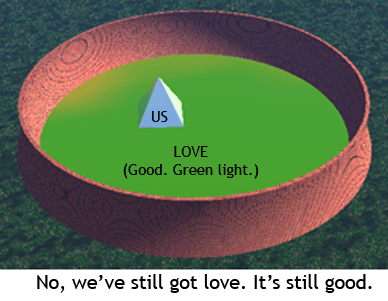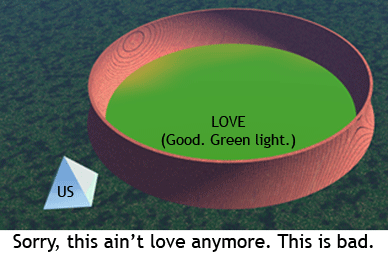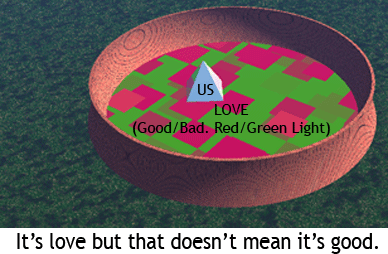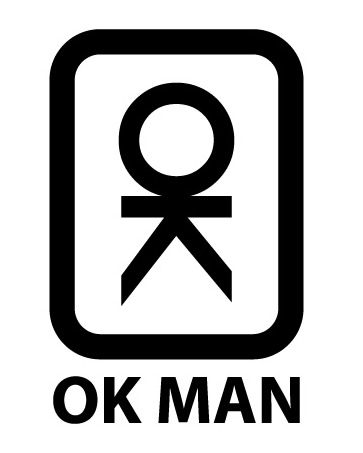OK Corral: Words Like Arrows Pointing the Way to OK
There’s an old debate in philosophy about what regular nouns represent. Proper nouns are easy by comparison, since they’re labels for particular things. Look for Jeremy Sherman in the real world and you can always point to me. But what about a regular noun like horse. Try to point to horse, and all you can point to is Silver, Flicka, and Mr. Ed? The word horse corrals a bunch of entities together. But just where is the corral? Or, to pose it the way medieval scholars would, if Plato is in Athens and Socrates is in Rome, where is man?
People working (and overworking) this question fall into two basic schools of thought (corrals, if you like). Nominalists think the corrals are mere human conventions: They’re just arbitrary categories we make up, or, as they called them in the Middle Ages, flatus vocis , which translates as “vocal flatulence.” By contrast, realists believe that the corrals, though not physical entities you can point to, are nonetheless real in the real world: We don’t invent them; we discover them.
There are weaknesses in the arguments on both sides of this debate. If the nominalists are right and the categories we come up with are arbitrary, why do we bother? What use are these corrals if they’re not grounded in reality?
If, instead, the realists are right, how do we discover these corrals? And how do we know we’ve identified the corrals correctly?
You might say it’s a fuss over nothing—a horse is a horse, of course, of course.
But what about evil? How do you corral all cases of evil? How do you know whether evil is even a real category? If it is, where does the category called evil reside? And how do we come up with a complete list of evil’s necessary and sufficient qualities so we would be sure to get all cases of evil into the corral and leave all cases of non-evil outside it?
Most of us intuit that the extreme positions on this old philosophical question are untenable. Extreme nominalism can’t be right—our categories for things are not mere arbitrary vocal flatulence. Sure, sometimes we come up with categories that are only in our heads, but sooner or later we correct ourselves (at least sometimes).
Extreme realists can’t be right, either. Sure, the categories are grounded in reality, but we don’t discover them automatically or with guaranteed precision.
And, indeed, philosophers have for the most part gotten over the extreme either/or version of the question. In the past two centuries, great progress has been made on figuring out how we come up with our corrals. (Search “Two and Two Together” for a short answer.)
Here’s a very short answer: We categorize by trial and error in interaction with our world. Our categorizations have consequences. We make a habit of particular categorizations when the consequences of them prove reliable and useful. We don’t do a perfect job of it, but we do well enough to get by. Our corrals are OK, and, when they aren’t, we adjust them. For example, we’ll put some particular behavior in the category of safe until the consequences of doing so prove dangerous, and then we’ll move that behavior out of that category.
Either that, or we redefine the category to include that activity. I’ve heard gurus say, “Death is perfectly safe,” which I suppose is true if you define the category broadly enough. Likewise, when one of those gurus said, “Don’t sweat the small stuff—and it’s all small stuff,” that, too, is true if you define the category of small stuff big enough to encompass everything.
Last week, I attempted to corral love. To do so, I had to distinguish between what love is (its denotation) and what our attitude about it is (its connotation). We think love is grand. We like it. The word’s connotations are positive. You can tell, because if someone called you “a loving person,” you would take it as a compliment.
As it’s typically used, the word love corrals particular behaviors together by their defining characteristics but also by their tendency to yield good outcomes. If there’s anything that gets in the way of our categories fitting reality, it’s the way our definitions are required to do double duty—corralling by denotation the things that have similar features but also corralling by connotation those things we feel similarly about.
Still, if it weren’t for this double duty our categories serve, they would probably be about as interesting to us as vocal flatulence. We embrace our categories precisely because they provide us, for better or for worse, with predictive power. That predictive power comes from the way words link a denotation and a connotation.
The word love is, in and of itself, a prediction. In the term love, we predict that particular symptoms bode well. The term is a kind of if-then statement: If [denotation], then [connotation]. If [my heart swells and I want to be with you and I’m dizzy in my appreciation of you,] then [it’s good and I can expect to want to stay with you a long time and be glad I did.]
Love is a term that corrals OK behaviors. Love is, in this respect, an OK corral. Things that belong inside it are OK. They bode well. Things that don’t fall inside it might not be OK. But there’s another question about whether the corral itself is OK. Did we define love right? How do you know it’s love—true love?
I’d like to highlight three moves available to us when we find ourselves doubting a chosen course of action—for example, when we thought that this is love and that therefore it bodes well, but now we’re not so sure; we’re wondering whether we should stay together.

Keeping your experience within the corral by expanding love’s denotations
1. Maintain the connotation of love as boding well.
2. Change your definition of love so it encompasses your experience.
3. End doubt by saying, “Yes, we should stay together.”
“Darling, I know you’re having doubts about us, but trust me: I love you, so we’re going to be just fine. I know I don’t come to visit much anymore or write or call, but, believe me, I still love you.”
Rejecting your experience from the corral based on love’s existing denotations
1. Maintain the connotations of love as boding well.
2. Maintain your description of love to exclude your experience.
3. End doubt by saying, “No, we should not stay together.”
“I’m sorry, but I’m not buying it. Love is something that grows and makes people want to spend more time together, not less. We might have lust, or convenience, but this sure isn’t love. I want you to take your things and go.”

Keeping your experience within the corral by changing love’s connotations
1. Change the connotations of love as necessarily boding well.
2. Maintain your description of love, encompassing your experience.
3. Sustain doubt, unsure about whether to stay together.
“Sure, we’re in love, but that’s not necessarily a good thing. Love isn’t always good for you. So, the fact that we love each other may be beside the point. The question is, ‘What will be good for us in the long run?'”

Categorical corralling is a human activity we call on to make predictions and settle doubts about whether our predictions are OK. Do our practices fall within the general category of OK or the general category of not OK? Should we stick with what we’re doing, or change it?
Or, to quote recent political debate, should we “stay the course,” or “cut and run”?
Stay the course: If [Denotation: Persist with current behavior], then [Connotation: good].
Cut and run: If [Denotation: Change current behavior], then [Connotation: evil].



